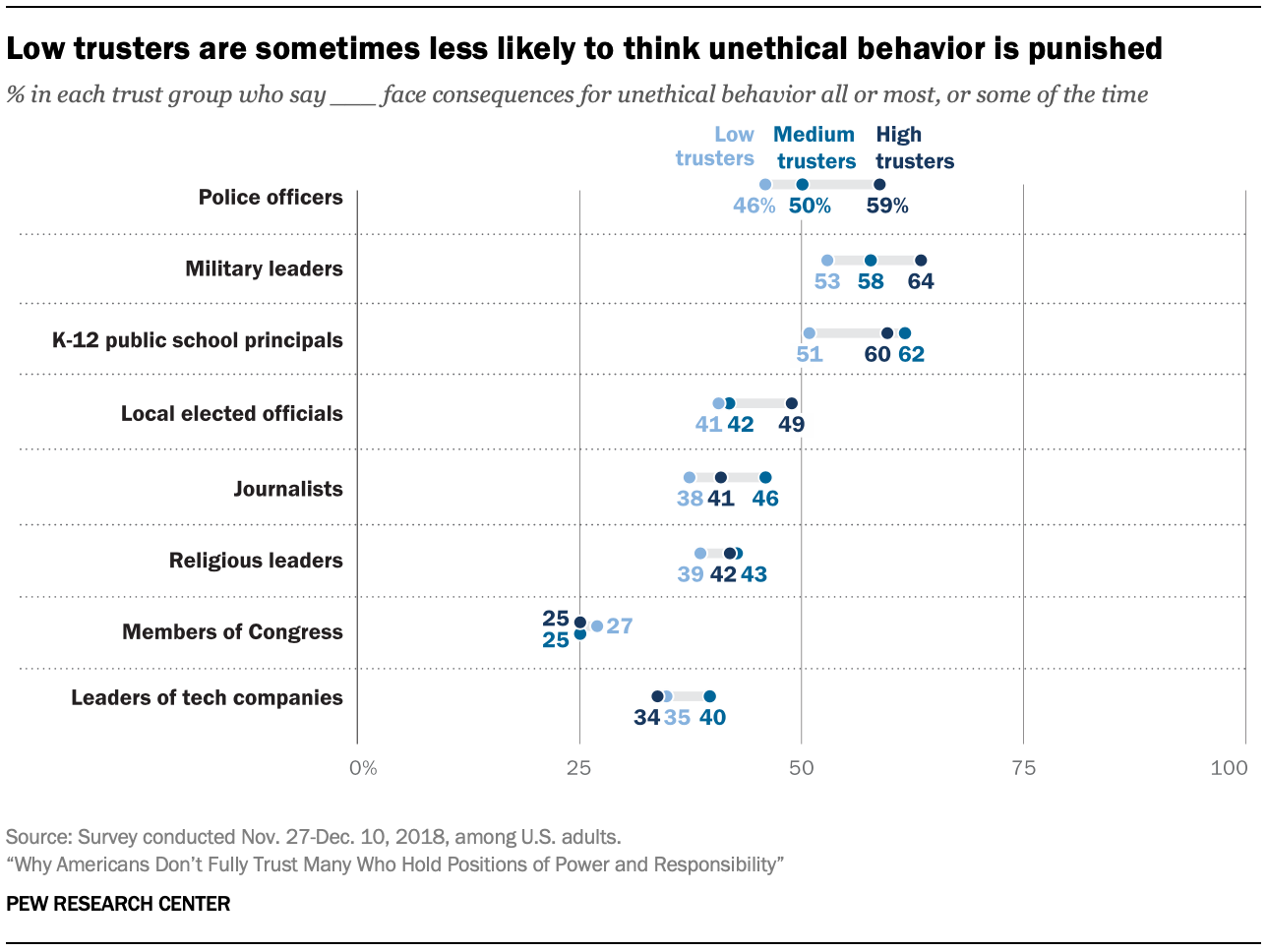Many Americans are not convinced that members of important groups behave ethically, and they are not very confident that those who hold jobs of power and responsibility face serious consequences when caught.
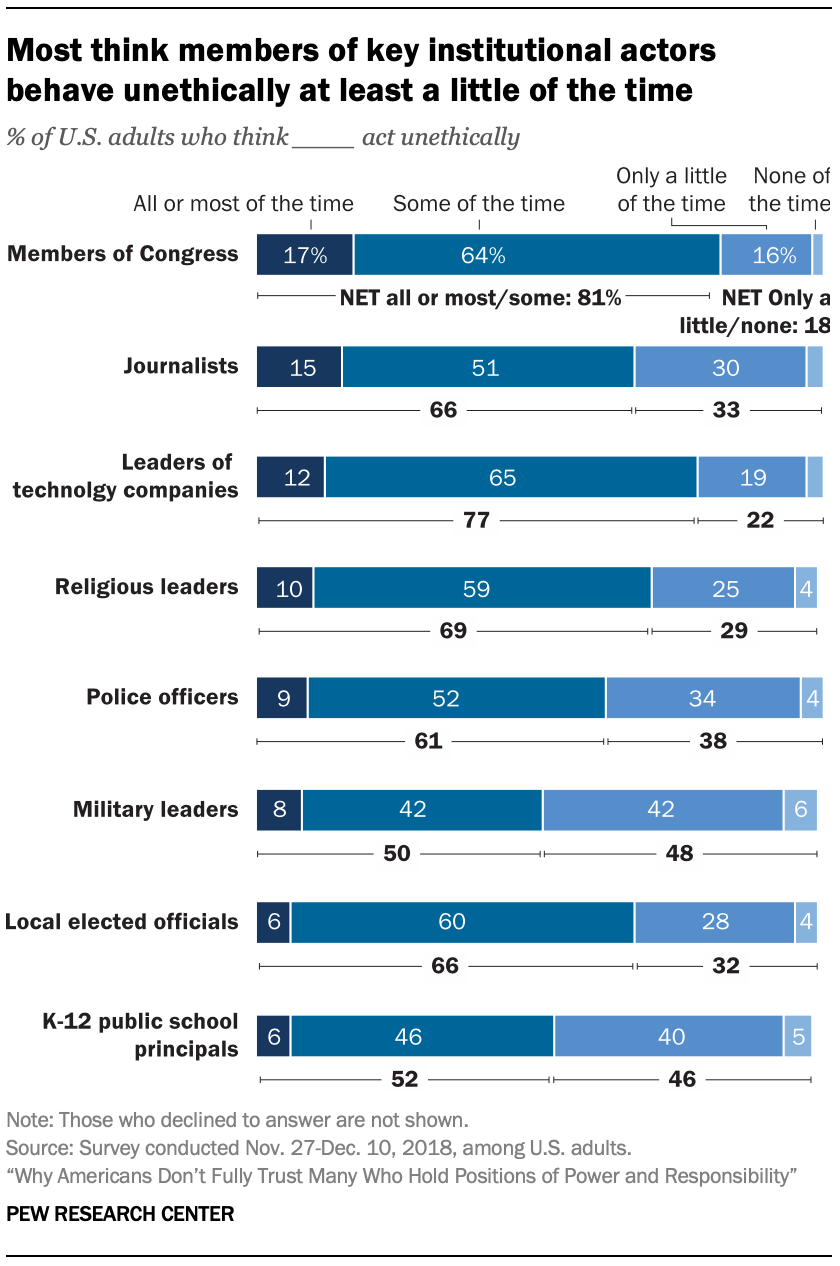 This survey tackled the issue of ethics with two questions and offered the same frequency options as other questions in the survey: “all or most of the time,” “some of the time,” “only a little of the time” or “none of the time.” The first question asked about how often members of different cohorts behave unethically. Roughly nine-in-ten adults or more say members of Congress, journalists, police officers, leaders of technology companies, local elected officials, religious leaders, public school principals and military leaders act unethically at least a little of the time.
This survey tackled the issue of ethics with two questions and offered the same frequency options as other questions in the survey: “all or most of the time,” “some of the time,” “only a little of the time” or “none of the time.” The first question asked about how often members of different cohorts behave unethically. Roughly nine-in-ten adults or more say members of Congress, journalists, police officers, leaders of technology companies, local elected officials, religious leaders, public school principals and military leaders act unethically at least a little of the time.
At least half of Americans believe members of these eight key groups behave unethically at least some of the time – and that includes those who are relatively trusted, such as military leaders and K-12 public school principals. Eight-in-ten adults (81%) think members of Congress behave unethically at least some of the time, and 77% believe this about leaders of technology companies.

Mirroring many of the other findings in the survey, opinions about the ethical behavior of the eight groups differ by race and ethnicity and political party. Black Americans are more likely than white adults to say local elected officials, leaders of public schools, military leaders and police officers act unethically at least some of the time.
Furthermore, some of the widest gaps in views of these groups are between Republicans and Democrats (including those who lean toward each party). Partisan opinions differ for five of the eight groups asked about in the survey. Compared with Democrats, Republicans are more likely to think journalists and leaders of public schools act unethically at least some of the time. But Democrats are more likely than Republicans to say military leaders, police officers and religious leaders behave unethically.
Assessments of the frequency of unethical behavior among journalists, military leaders and police officers produce the largest gaps. Eight-in-ten Republicans and Republican leaners say journalists behave unethically at least some of the time, compared with 53% of Democrats and Democratic leaners who say this, a 29-point gap. There is a similarly large gap in opinions of military leaders (27-point gap, with Democrats more likely to say military leaders act unethically). In terms of ethical behavior among police officers, a larger share of Democrats than Republicans think police officers regularly act unethically, with a 26-point gap in opinion between the two groups.
There are no partisan differences in opinion about the ethical behavior of members of Congress, local elected officials or leaders of technology companies.
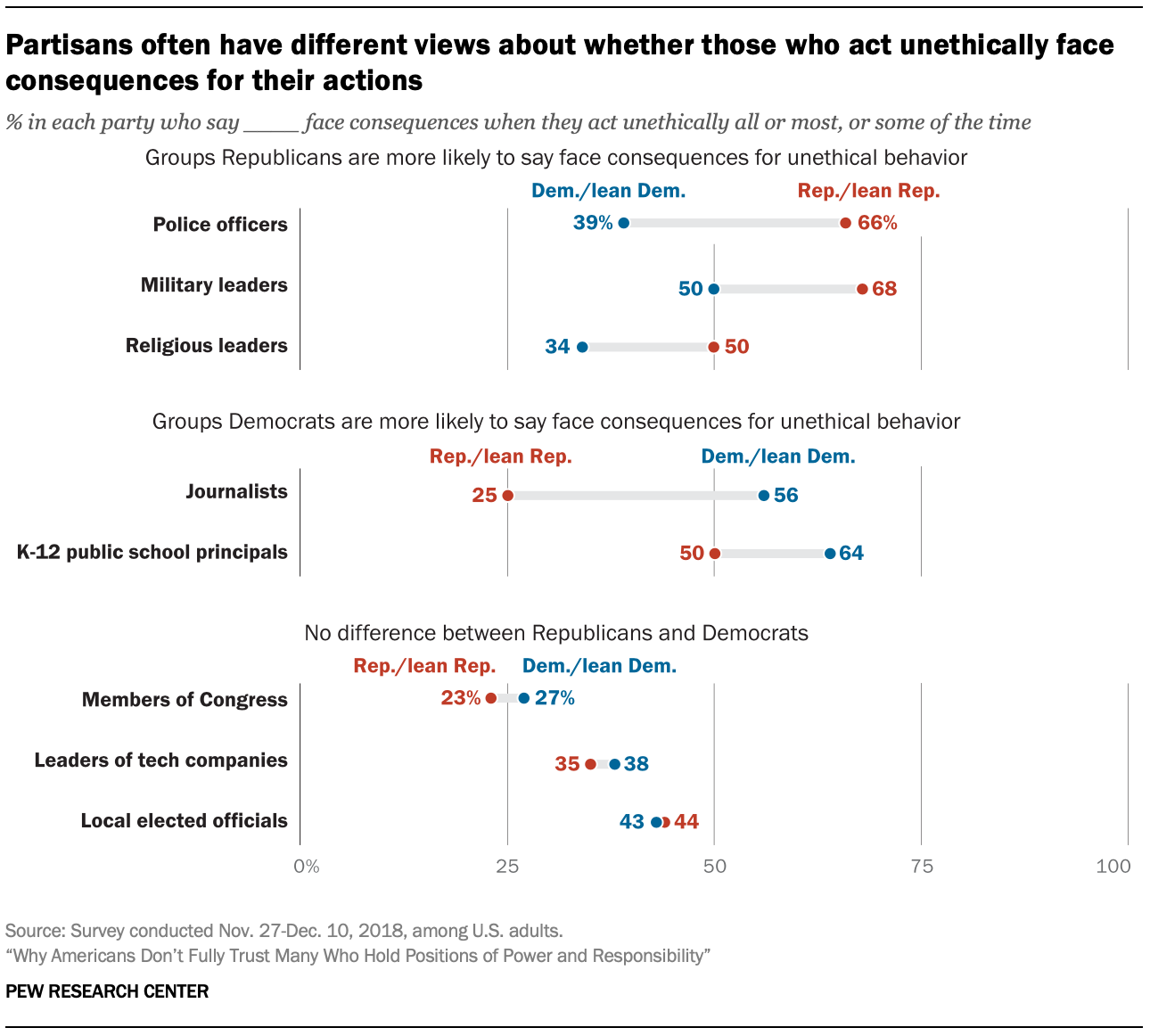
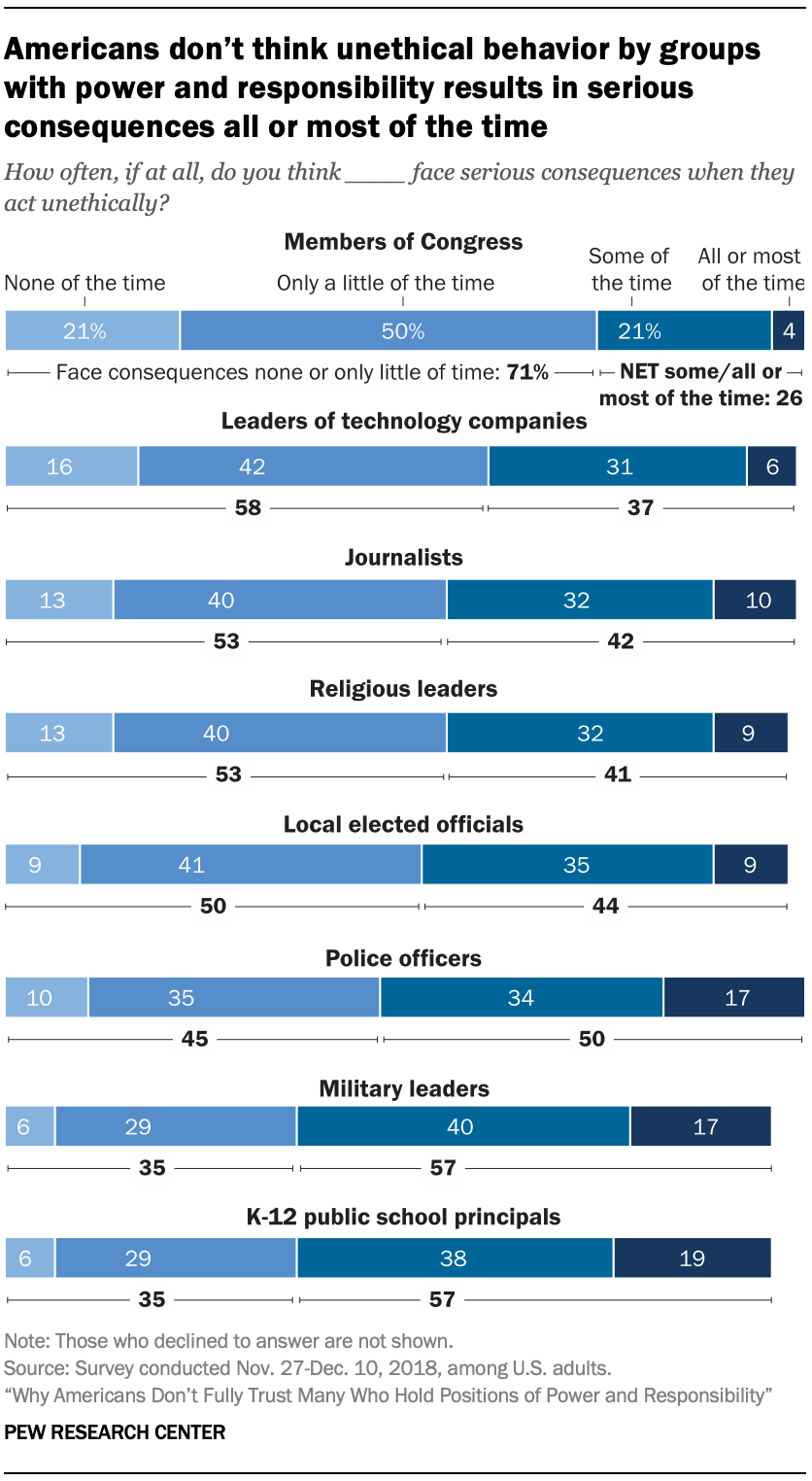 The second question dealing with this issue asked how often those who behave unethically in these major institutional groups face serious consequences for their actions. Notably, majorities of U.S. adults say members of Congress (71%) and leaders of technology companies (58%) face consequences for wrong behavior only a little or none of the time. About half believe journalists (53%), religious leaders (53%) and local elected officials (50%) face serious conse
The second question dealing with this issue asked how often those who behave unethically in these major institutional groups face serious consequences for their actions. Notably, majorities of U.S. adults say members of Congress (71%) and leaders of technology companies (58%) face consequences for wrong behavior only a little or none of the time. About half believe journalists (53%), religious leaders (53%) and local elected officials (50%) face serious conse
quences when they act unethically only a little or none of the time.
Put another way, roughly one-in-five or fewer say people in these groups face serious consequences for their actions “all or most” of the time.
Republicans and Democrats disagree about how often many in the eight major groups act unethically, and these divides extend to their opinions about these groups facing consequences for their actions. Republicans are more likely than Democrats to say military leaders, police officers and religious leaders face consequences for their unethical behavior. Democrats, on the other hand, are more likely to believe that journalists and leaders of public schools face consequences for their actions at least some of the time.
Other demographic differences are less clear. Although consistent with other survey findings, black people are much less likely than whites and Hispanics to say police officers face consequences for their actions “all or most” or “some of the time” (31% of black people say this vs. 56% among whites and 49% among Hispanics).
Personal trust is connected to people’s assessments of unethical behavior
A previous report on the state of personal trust in the U.S. divided American adults into three categories – high trusters, medium trusters and low trusters – based on their responses to questions about people’s general trust or distrust in others, their sense of the exploitative tendencies or fairness of others, and their assessment of the overall helpfulness or selfishness of others.5 In general, the opinions of those in the three trust categories about the frequency of ethical behavior among those in positions of power and responsibility mirror the opinions of the public as a whole. But those with the lowest level of trust are more likely than those with high levels of trust to say each of the groups asked about in the survey acts unethically at least some of the time. Two exceptions are religious leaders and leaders of tech companies – there are no differences in opinion among high, medium and low trusters for these groups.
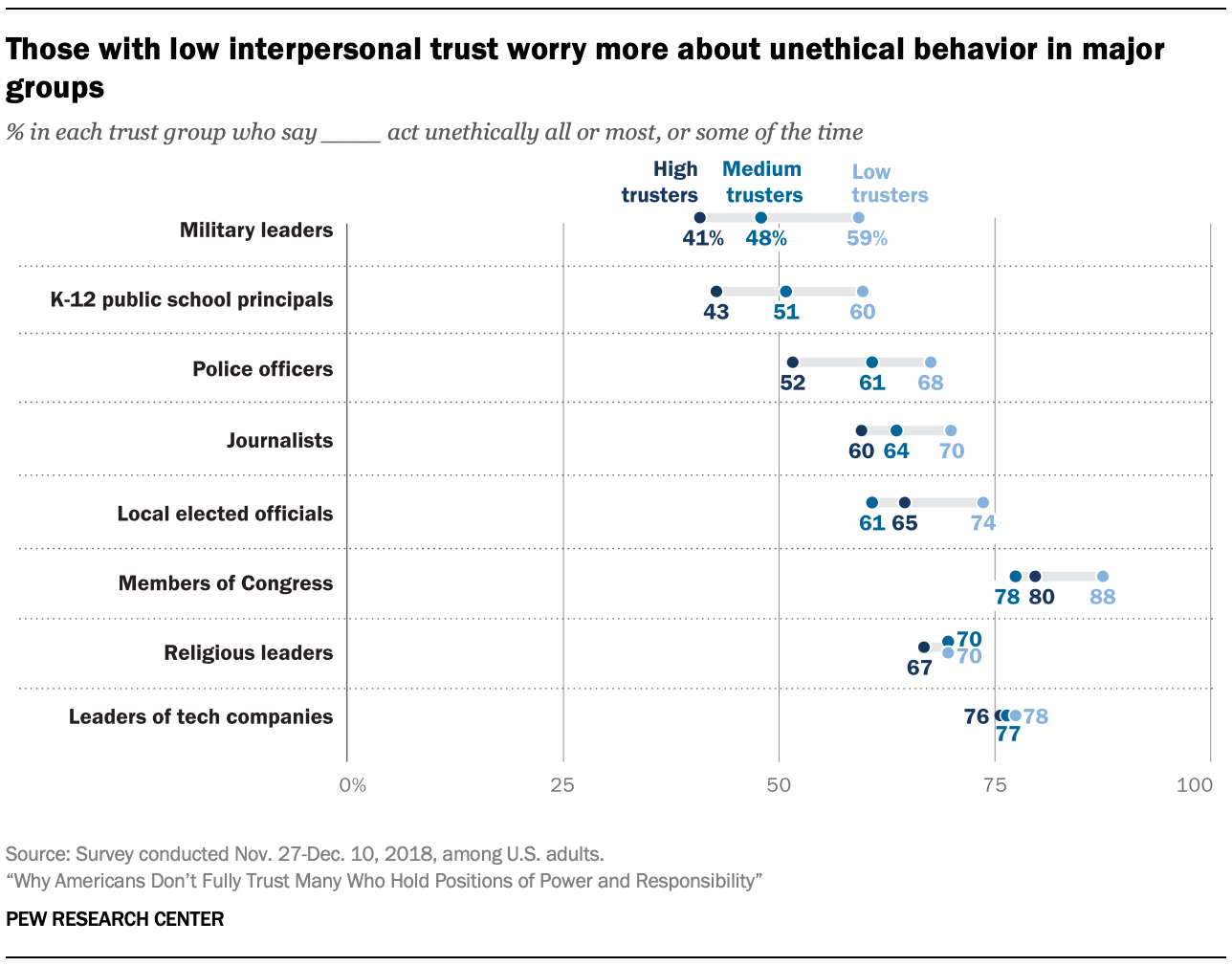
But when it comes to perceptions of whether unethical actors in these groups face consequences for their actions, opinions are more mixed. For instance, high trusters tend to be more likely than low trusters to think police officers, military leaders, K-12 principals and local elected officials face consequences for their actions “all or most” or “some of the time.” But there are no differences in opinion about how often members of Congress, journalists, leaders of technology companies and religious leaders face consequences for their unethical behavior.
